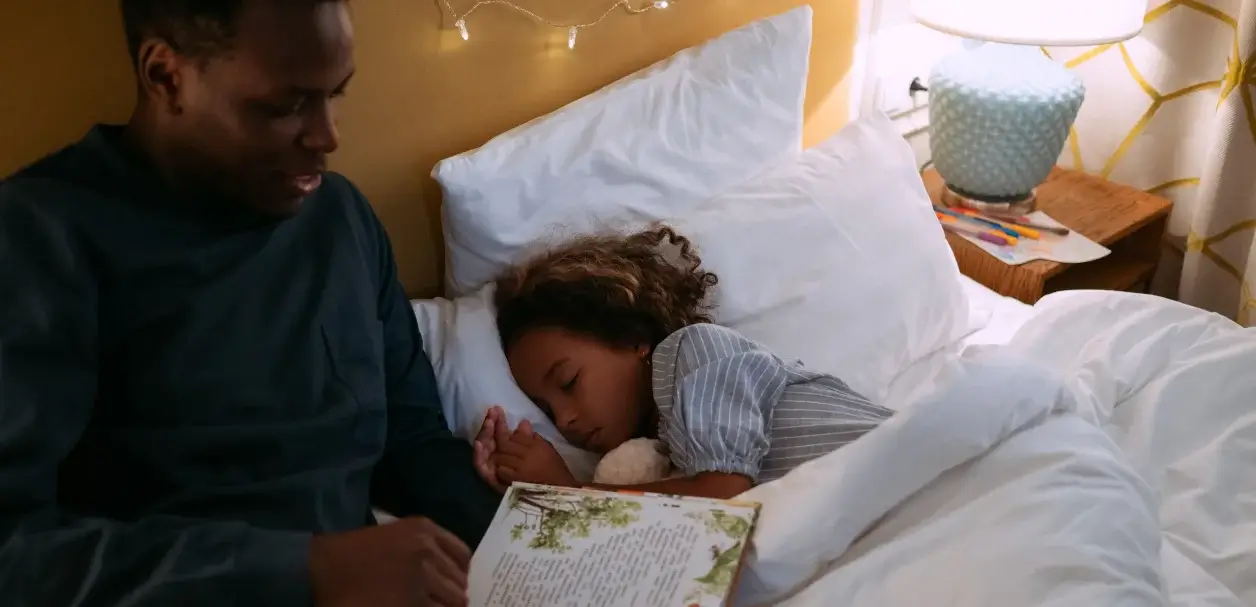Maintaining or improving family wellbeing is a tightrope act. From financial hardships to time pressures and life upheavals, there are a host of challenges primed to throw it off. And that’s before factoring in the daily struggle of parenting itself, complete with its constant juggle of cleaning, managing tantrums, and food prep. Not to mention the destabilizing effects of recent lockdowns and the pandemic’s toll.
Hardly surprising then, that parental stress and reports of parental burnout seem to be at an all-time high. The end result of all this stress? It lands with our kids. Which is one reason childhood development expert Dr. Gabor Maté says that “the primary task of parenting is self-parenting, taking care of ourselves.”
But self-care for moms and dads doesn’t have to mean taking time out of the family flow. In fact, here’s a radically simple self-care practice that should come as welcome news for overburdened parents: Reading books with your children. Yes, it’s good for your kids. It nurtures their early literacy through boosting language development, building vocabulary and stimulating brain capacity, plus brings them a multitude of social and emotional benefits. But evidence suggests it can also help you, reducing your stress, easing depression, boosting your self-esteem, and making you feel more connected.
Shared Reading Lowers Parenting Stress
Can reading with your children really have that much of an impact on reducing parental stress? Yes, according to some exciting research.
Researchers looked at what happened to parenting stress levels in a group of mothers when they were encouraged and guided through verbal interactions with their children, via pretend play, shared reading, and everyday routines. The results were eye-opening.
Promoting positive parent-child interactions resulted in parenting stress levels that were 17.7 percent lower than those in the control group, even when those moms experienced financial hardships and educational challenges in addition to their parenting load. That’s huge.
Reading to Your Kids May Help with Parental Depression
Another study looked at the effects of the Reach Out and Read program on a small sample of young mothers. Though the study size was limited, the positive outcomes were notable. Adolescent mothers who read with their children were nearly five times more likely to report that reading was one of their favorite activities to do with their child, and seven times more likely to report that reading was one of their child’s favorite activities. So, they were rewarded with a high level of enjoyment on both sides.
But, what’s more, among the mothers reading with their children, the odds of having clinically significant depression decreased by nearly half, while for those in the control group the odds actually increased. That’s a big result for a small wellbeing practice.
Sharing Story Time Boosts Parents’ Self-Esteem
Stress, difficult life events, anxiety, loneliness, and depression can all take their toll on self-esteem. Nurturing self-esteem and our sense of self-efficacy—feeling that we are capable—is an important part of caring for ourselves.
And there’s evidence to suggest that reading with your kids can even help in this area, too. When parents gave feedback after taking part in family literacy programs, one of the main benefits they reported was an uptick in their confidence—in themselves generally, in their ability to communicate, in their own literacy skills, and in their ability to help their children.
So next time you pick up a book with your kid, just think: You might get a little confidence boost while you’re at it. And as every parent trying to do their best knows, that’s no small thing.
Family Reading is Good for Parents Over Time
Of course, reading with your children is about more than what’s going on during the time you’re enjoying a story together. The benefits build and continue long after the book has closed. And that goes for its effects on parental wellbeing, too.
In one study, the impacts of shared reading between low-income mothers and their kids, from infancy through to toddlerhood, produced encouraging results when it came to parental stress, parental warmth, and parental sensitivity. Reading with kids at six months was positively correlated with experiencing less parental stress when their babies reached 18 months, suggesting that early shared reading pays off for parents down the line. Sounds like a self-care investment worth making.
When it comes to parental stress, parental burnout and family wellbeing, there are no quick fixes. But it’s good to know that something as simple as sharing a book together benefits not just one generation, but two. And that the evidence for its effectiveness is mounting.
It doesn’t take much to get behind the idea of a better parent-child relationship, being close, taking a quiet few moments, enjoying a cuddle, and feeling the pressure ease off you as a parent to be “active.” So, next time one of your go-to self-care activities feels too ambitious or unrealistic, remember that reading to your little one can be self-care, too, and you can continue reaping the benefits long after it’s over.

